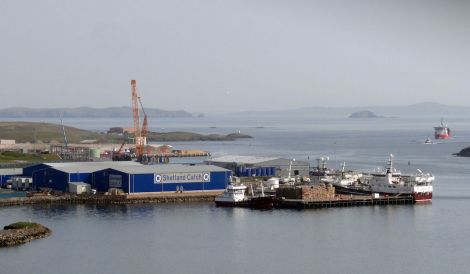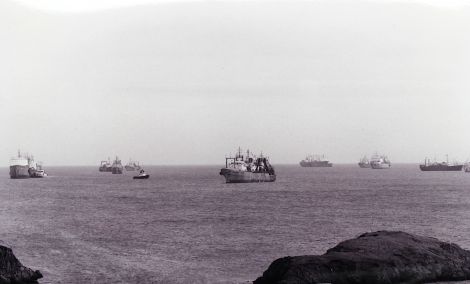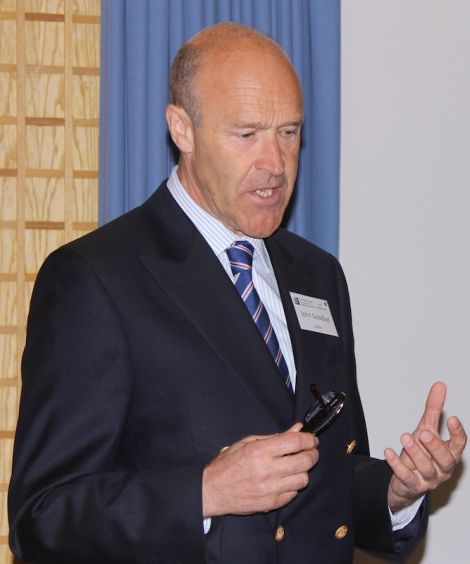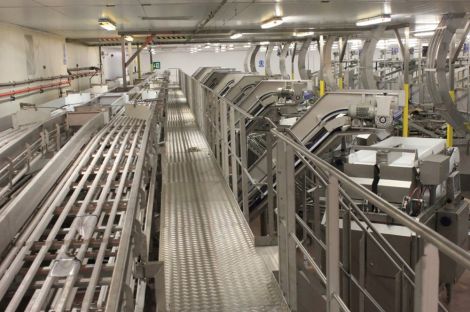News / Catch celebrates 25 years of processing
SHETLAND Catch, one of Europe’s largest pelagic fish processing companies, is celebrating its 25th birthday this weekend with an open day on Saturday.
The massive plant at the north end of Lerwick harbour, which was founded by the Shetland Fish Producer’s Organisation (SFPO) and what was then Lerwick Harbour Trust, is today an international player in a highly profitable industry.
Following a turbulent recent history, which saw Shetland Catch deeply implicated in the UK’s largest black fish scam a decade ago, the company is today rebuilding its reputation on the basis of sustainability and the MSC certification of the pelagic fisheries.
It all started at the height of the klondyker activities around Lerwick harbour in the late ’80s when dozens of factory ships anchored off Bressay processing mackerel and herring for the East European market.
Shetland Catch chairman John Goodlad said the world was a very different place then with the Cold War and no domestic market for either mackerel or herring.
In addition, Shetland had almost lost its century old tradition and knowledge of herring processing.
“Looking out into Lerwick every night we could see all these klondykers providing as many as 8,000 jobs to eastern bloc workers, and yet there was no processing capability here in Shetland and boats were getting a poor price. There had to be a better way of doing it,” he said.
“The PO, representing the boats, and the Lerwick Harbour Trust, as it was then, began talking about building a processing plant in Shetland. That was the beginning of Shetland Catch.”
The first plant at Gremista had a processing capacity of 150 tonnes per day. The company initially struggled along as they learned the business and came to know their markets, which today are mainly in Eastern Europe, the Far East and Africa.
Become a member of Shetland News
Following some smaller expansion during the ’90s the management quickly realised that a major investment was needed to keep up with the boats, which became larger and more efficient.
In 2001 Shetland Catch completed a £9.5 million investment, which saw its processing capacity grow to 1,000 tonnes a day. The company also added a coldstore capable of holding 12,000 tonnes.
“We went from being another fairly small pelagic processor to becoming one of the biggest in Europe, if not the biggest,” Goodlad said.
For the first few years of the new millennia, most of the Scottish pelagic industry was involved on over quota landings, including Shetland Catch and local boats.
Between 2002 and 2005 around 170,000 tonnes of mackerel were illegally landed in three different processing factories in Shetland and north east Scotland
Two years ago Shetland Catch was ordered to pay £1.65 million in fines and compensation for its part in the scam.
However High Court hearing Judge Lord Turnbull acknowledged that the industry had turned a corner since then and transformed its way of operating.
“The net result of that is that there is now proper regulation of the quotas, prices have gone up because the market is not over supplied, and we have been able to move the industry through MCS certification to a much better place,” Goodlad said.
“We now have an industry that is not only very profitable and very efficient but it is also sustainably managed and environmentally responsible. That is a huge step change for this industry.”
Over recent years, the company has quietly continued modernising and automating the factory with the latest processing equipment, a strategy Goodlad believes will secure its long term viability.
He also expressed confidence that the ongoing mackerel dispute with Iceland will be resolved, but is concerned about the sustainability of current quota levels.
“The mackerel stock is extremely healthy at the moment, but can it sustain a mackerel quota of this level?
“Has the mackerel quota gone up to this level in order to get a deal with Faroe and Iceland? Many people in the industry believe it has and have some reservation whether the mackerel quota can be sustained at this level.
“We have got an agreement with Faroe. The Shetland Fishermen’s Association has rightly been very critical of that deal. But there is a deal, and I am pretty sure before too long there will be a deal with Iceland.
“We just have to hope that the proper management measures that are in place mean that we can continue to have that mackerel quota going into the future.”
Shetland Catch is today 50 per cent owned by Norwegian company Pelagia with the remaining half almost equally shared between the SFPO and Lerwick Port Authority.
The company employs between 40 and 50 core staff, which rises to around 100 employees during the herring and mackerel seasons.
Processing around 60,000 tonnes of fish a year, of which 45,000 tonnes are mackerel, the company turns over between £60 and £80 million annually.
Saturday’s open day will kick off at 12 noon for those wishing to tour the factory floor and have a look round the pelagic trawlers Adenia and Charisma.
The main event will be held in one of the company’s vast cold stores, where visitors will have the chance to view an exhibition of photographs plotting the development of the processing facility, and enjoy canapés, teas, coffee and home bakes.
Become a member of Shetland News
Shetland News is asking its readers to consider paying for membership to get additional perks:
- Removal of third-party ads;
- Bookmark posts to read later;
- Exclusive curated weekly newsletter;
- Hide membership messages;
- Comments open for discussion.
If you appreciate what we do and feel strongly about impartial local journalism, then please become a member of Shetland News by either making a single payment, or setting up a monthly, quarterly or yearly subscription.
































































